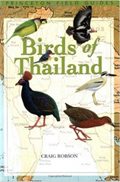
|
||||||||||
|
||||||||||
|
||||||||||
| Favorite Tweets by @thaibirding | ||||||||||
|
||||||||||
 Buy on Birds of Thailand on Amazon.co.uk from £16.34 |
||||||||||
| Site Map ; Contributors |
| Fields near Thatorn, 23rd Oct 2001 | |||||||||||
|
|||||||||||
| Tweet | |||||||||||
| Introduction Despite reports bemoaning the destruction of the rice paddies around Thatorn, in Chiang Mai province, that in the past was so productive for birds, I decided to take a walk around this area to see if it was still a worthwhile birding location. Walking south over the bridge in the village of TaTorn I took the second left towards the farmland. At the end of this lane is an abandoned resort, beyond this is a series of farm tracks, fields and ditches which one can wander around pretty freely in search of birds. |
|||||||||||
|
|||||||||||
| Although
there were quite a few birds to be seen, the reports that rice-growing
had been exchanged for fruit and vegetable crops were clearly true
and this would certainly influence the number and type of birds to
be seen here. The trail along the river didn't appear too promising, veering away into some dry vegetable fields, so I walked southwards away from the river towards a series of reed-filled ditches. Eastern Stonechat, Pied Bushchat and Grey-breasted Prinia did their best to entertain me and it was whilst watching these that I heard an interesting call in the undergrowth. After much short-focussing of my binoculars I managed to get rather pathetic views of a Siberian Rubythroat; not the best way to see a new bird, but still an interesting observation. Having reached the reedy ditches I began to feel more optimistic about finding something interesting as the habitat appeared more promising. As expected I soon found both Dusky and Oriental Reed Warblers as well as a whole load of more everyday species such as Sooty-headed Bulbul and Spotted Dovel. The more I explored the area, the more encouraged I was that there was still sufficient habitat to make birding worthwhile; a few stubble fields survive, a few small reedbeds and some open pools. In fact, the further south I went from the river, the better the habitat became and with it some more interesting birds revealed themselves - it may be that birders have to explore further away from the river than before. Continuing my walk a pair of Barred Buttonquail showed themselves quite nicely on the edge of a stubble field, a species that is often only seen as a brief glimpse, and flying out of a dead tree a Eurasian Wryneck gave me a far more satisfying addition to my life-list than the earlier Rubythroat. |
|||||||||||
|
|||||||||||
Finging
quite a few interesting birds and some good habitat made me feel
like this walk hadn't been a waste of time, indeed, it was interesting
to get out into a habitat that isn't often visited in Thailand:
farmland. Despite the fact that this area has obviously suffered
a lot of habitat degradation over the years I feel it is still worth
a look, especially due to its geographical position; a good place
to find scarce birds or even a new species for Thailand. Certainly
it is still a nice place to have a walk and TaTorn has some nice
accomodation available and some decent places to eat; for me it
is always somewhere I stop on a visit to the north of Thailand,
due to its regular bus service from Chiang Mai, as it is a pleasant
and quiet place to relax for someone who lives in busy Bangkok. |
|||||||||||
| Nick Upton (nickupton@thaibirding.com) | |||||||||||
| Birds seen at TaTorn | |||||||||||
| 1.
Chinese Pond Heron 2. Intermediate Egret 3. Black-shouldered Kite 4. Shikra 5. Barred Buttonquail 6. White Breasted Waterhen 7. Common Greenshank 8. Green Sandpiper 9. Common Snipe 10. Rock Pigeon 11. Spotted Dove 12. Greater Coucal 13. Lesser Coucal 14. Asian Barred Owlet 15. Common Kingfisher 16. White-throated Kingfisher 17. Indian Roller 18. Eurasian Wryneck 19. House Swift 20. Barn Swallow 21. Oriental Skylark 22. Richard's Pipit 23. Paddyfield Pipit 24. Olive-backed Pipit 25. White Wagtail 26. Grey Wagtail |
27.
Common Iora 28. Red-whiskered Bulbul 29. Sooty-headed Bulbul 30. Black Drongo 31. Dusky Warbler 32. Yellow-browed Warbler 33. Oriental Reed Warbler 34. Zitting Cisticola 35. Grey-breasted Prinia 36. Plain Prinia 37. Common Tailorbird 38. Siberian Rubythroat 39. Oriental Magpie Robin 40. Eastern Stonechat 41. Pied Bushchat 42. Taiga Flycatcher 43. Brown Shrike 44. Long-tailed Shrike 45. Chestnut-tailed Starling 46. Black-collared Starling 47. Common Myna 48. White-vented Myna 49. Eurasian Tree Sparrow 50. White-rumped Munia 51. Scaly-breasted Munia |
||||||||||
| Nick Upton can be contacted at nickupton@thaibirding.com | |||||||||||
| More information on Thatorn Riverside & Rice Fields | More information on birdwatching locations in the North of Thailand. | ||||||||||
| If you are interested in arranging a bird watching tour you can see some suggested itineraries here - Birdwatching Trips - and you can contact me at the above email address to discuss the best options. | |||||||||||
 |
|||||||||||
|
Tweet |
|||||||||||

A Guide to Birdwatching in Thailand. Copyright © 2004-2016 thaibirding.com. All rights reserved.

